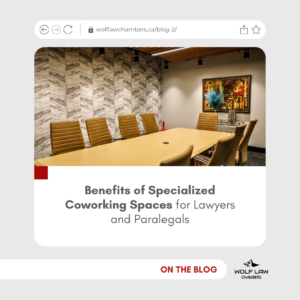Wellness
Collaboration Tools for Legal Teams in a Remote Work Environment.
The shift to remote work has transformed how legal teams collaborate, making efficient communication and document management more critical than ever. Choosing the right tools can enhance productivity, ensure compliance, and maintain seamless teamwork. Here are some of the top collaboration tools designed for legal teams operating in a remote setting:
1. Secure Document Management:
- NetDocuments and iManage offer cloud-based solutions tailored for law firms, ensuring secure storage, version control, and easy retrieval of legal files.
- Dropbox Business and Google Drive provide user-friendly document-sharing capabilities with access control settings.
2. Real-Time Communication:
- Microsoft Teams and Slack enable quick messaging, video conferencing, and file sharing, keeping legal teams connected across locations.
- Zoom remains a go-to option for client meetings, depositions, and virtual court proceedings.
3. E-Signature and Workflow Automation:
- DocuSign and Adobe Sign streamline contract execution with legally binding electronic signatures.
- Clio and PracticePanther integrate case management with automated workflows, reducing administrative tasks.
4. Legal Research and Knowledge Management:
- Westlaw and LexisNexis provide remote access to case law, statutes, and legal research tools.
- HighQ facilitates knowledge-sharing within legal teams through AI-powered search and collaboration features.
5. Security and Compliance:
- Ethos and Proofpoint enhance email security and ensure data protection for client communications.
- VeraCrypt adds an extra layer of encryption for confidential documents.
With the right collaboration tools, legal teams can navigate remote work effectively while maintaining the confidentiality and efficiency required in the legal industry. What tools does your legal team rely on? Share your thoughts in the comments!
How Workflow Automation Apps Save Time for Busy Law Firms
In today’s fast-paced legal industry, efficiency is a necessity. Law firms juggle tasks like case management, document drafting, client communication, and billing. Workflow automation apps streamline operations, saving time for what matters most—delivering exceptional legal services.
Time-Saving Benefits for Law Firms
- Document Management: Automation apps organize, store, and retrieve files quickly by tagging them by case or client.
- Client Communication: Tools can send reminders, schedule appointments, and handle routine inquiries, ensuring timely updates.
- Billing and Payments: Automation generates invoices, sends payment reminders, and processes payments seamlessly.
- Task Management: Assign tasks, set deadlines, and get notifications to stay on track.
- Compliance: Automation ensures filing deadlines and data storage meet regulatory standards, reducing risks.
Final Thoughts
Automation empowers legal teams by eliminating repetitive tasks, allowing them to focus on clients and complex legal matters. Ready to save time and boost efficiency? Share your experiences in the comments!
Best Apps to Organize Legal Documents on the Go
In the fast-paced legal world, managing and accessing documents efficiently is critical. Whether you’re a lawyer, paralegal, or business professional, the right app can make all the difference. Here are some of the best apps to organize your legal documents while on the move:
- Dropbox
A tried-and-true favorite, Dropbox is perfect for securely storing, organizing, and sharing legal documents. With its robust mobile app, you can access your files anywhere, collaborate with colleagues, and integrate with other productivity tools. - Evernote
Need to organize notes and documents in one place? Evernote lets you scan, store, and categorize legal documents effortlessly. Its search functionality even recognizes text within images and PDFs, saving you time. - Clio
Designed specifically for legal professionals, Clio is an all-in-one solution. It offers document management, case tracking, and secure client communication—all accessible via its mobile app. - Adobe Acrobat Reader
When it comes to editing and annotating PDFs on the go, Adobe Acrobat Reader is unmatched. You can sign, highlight, and share legal documents securely from your smartphone or tablet. - Notion
For customizable document organization, Notion is a great choice. It allows you to create shared workspaces, track tasks, and keep case-related notes neatly organized. - ScanSnap
If you often deal with physical documents, ScanSnap turns your phone into a portable scanner. It captures high-quality scans and integrates with storage apps like Dropbox and Google Drive for seamless file management.
Pro Tip: Always ensure your apps comply with data security and privacy regulations like GDPR or HIPAA to protect sensitive legal information.
#LegalTech #ProductivityApps #DocumentManagement
Top Productivity Apps for Paralegals in 2025
Paralegals are the backbone of legal operations, handling research, drafting, and case management under tight deadlines. Staying organized and efficient is crucial in this fast-paced field. Here are the top productivity apps every paralegal should consider in 2025:
1. Clio
Clio remains a leader in legal case management software. Its ability to streamline document management, case tracking, and client communication makes it a vital tool for legal teams.
2. Notion
Notion’s customizable workspace is perfect for creating to-do lists, tracking projects, and storing case-related notes. Its collaborative features also make team coordination seamless.
3. Trello
For visual task management, Trello’s boards and cards allow you to prioritize and monitor deadlines effectively. It’s great for managing multiple cases simultaneously.
4. CaseFox
Designed specifically for legal professionals, CaseFox offers time tracking, billing, and task management. It’s intuitive and helps save valuable time on administrative tasks.
5. Grammarly
Drafting accurate legal documents is critical. Grammarly ensures your writing is clear, error-free, and professional, making it indispensable for reports, contracts, and emails.
6. Adobe Acrobat
Handling legal documents often involves working with PDFs. Adobe Acrobat’s advanced editing and signing capabilities simplify the process, keeping you productive and organized.
7. Otter.ai
Transcription tasks can eat up a lot of time. Otter.ai converts spoken words into text in real-time, making it easier to document client meetings or interviews.
Why These Apps?
In 2025, efficiency and adaptability are key. These apps help paralegals reduce manual effort, minimize errors, and maintain organization in a demanding profession. By leveraging technology, you can focus on the work that matters most.
How to Choose the Right Coworking Space for Your Legal Practice.
As a legal professional, your choice of workspace plays a crucial role in building trust, maintaining confidentiality, and growing your practice. Here’s how to choose the perfect coworking space for your needs:
1. Evaluate Location
Choose a space in a professional neighborhood that’s easily accessible for your clients and provides proximity to courthouses or other legal hubs.
2. Consider Professional Amenities
A good coworking space for legal professionals should offer essential amenities like:
- On-demand meeting rooms for client consultations.
- Printing, scanning, and storage options for legal documents.
- Reception services to create a polished first impression.
3. Network Opportunities
Some coworking spaces host networking events or house professionals from complementary fields, such as finance or real estate, which could generate referrals for your practice.
4. Test the Culture
Ensure the environment aligns with your professionalism. Visit the space, observe its vibe, and assess whether it supports focused, high-quality work.
Choosing the right coworking space isn’t just about functionality; it’s about finding a place that supports the credibility and efficiency of your practice. Take your time, weigh your options, and invest in a space that sets you up for success.
Benefits of Specialized Coworking Spaces for Lawyers and Paralegals
As the legal profession evolves, specialized coworking spaces are gaining traction as a valuable resource for lawyers and paralegals. Unlike traditional offices or generic coworking hubs, these tailored environments offer unique benefits that address the specific needs of legal professionals.
1. Professional Atmosphere
Specialized coworking spaces cater to the professional standards of the legal industry. They provide private offices, meeting rooms, and settings that exude credibility—ideal for client consultations and sensitive discussions.
2. Cost-Effective Solutions
For solo practitioners and small law firms, renting a full-fledged office can be costly. Coworking spaces offer flexible memberships, enabling legal professionals to access high-end facilities without the financial burden of long-term leases.
3. Access to Legal Resources
Many specialized spaces provide access to tools like legal research databases, court filing assistance, and even notary services. These resources streamline day-to-day tasks, allowing teams to focus on casework.
4. Networking Opportunities
Sharing a workspace with other legal professionals fosters collaboration and networking. Whether it’s exchanging insights or referring clients, the connections formed in these environments can lead to valuable partnerships.
5. Enhanced Productivity
Designed with the legal workflow in mind, these spaces minimize distractions and support focused work. Amenities such as ergonomic furniture, high-speed internet, and secure file storage further enhance efficiency.
Specialized coworking spaces are more than just a trend—they’re a smart solution for modern legal professionals seeking flexibility, professionalism, and community. If you’re a lawyer or paralegal looking to elevate your practice, consider exploring these tailored spaces to meet your needs.
How Coworking Spaces Foster Collaboration Across Legal Areas of Practice
Coworking spaces are transforming the way professionals across various industries collaborate, and the legal field is no exception. Traditionally, law firms have been separate, hierarchical entities, often operating in silos. However, coworking spaces are encouraging lawyers from different practice areas to connect, share knowledge, and collaborate on projects.
One of the primary advantages of coworking spaces is the diverse community they bring together. Legal professionals from corporate law, intellectual property, criminal defense, and other specialties work side by side, creating opportunities for cross-disciplinary collaboration. By networking in a casual, open environment, lawyers can exchange ideas, seek advice, and even partner on cases that require expertise from multiple legal fields.
These shared spaces also help break down traditional barriers that can limit collaboration. Many smaller law firms or solo practitioners don’t have the resources to establish large office networks, but coworking spaces provide affordable, flexible environments where legal professionals can interact with colleagues they might not have met otherwise. Whether through informal conversations in the kitchen or during organized networking events, the physical proximity sparks connections that benefit the legal community.
Moreover, coworking spaces often host workshops, seminars, and panel discussions on various legal topics, providing an additional avenue for collaboration. These events allow legal professionals to stay updated on trends, enhance their skill sets, and collaborate on shared interests.
In conclusion, coworking spaces are more than just shared offices. They are vibrant hubs that encourage collaboration across different legal areas, leading to innovative solutions and more effective legal practices. By fostering a sense of community and shared knowledge, these spaces are helping reshape the future of legal work.
Why Coworking Spaces Are a Game-Changer for Legal Professionals
In the fast-paced world of law, legal professionals are constantly seeking ways to stay ahead of the curve. As client demands evolve and business landscapes shift, one solution that is making waves in the legal field is coworking spaces.
Coworking spaces offer a flexible and cost-effective alternative to traditional office environments, and for legal professionals, they bring unique advantages. Here’s why coworking spaces are becoming a game-changer for lawyers, paralegals, and legal consultants:
1. Flexibility and Cost Efficiency Law firms, especially small and solo practices, often face the challenge of high office rent and overhead costs. Coworking spaces provide fully equipped offices without the commitment of long-term leases, allowing legal professionals to scale as needed.
2. Networking Opportunities Working alongside professionals from different industries creates a dynamic environment. Legal professionals can tap into a valuable network of potential clients, collaborators, and referral partners, which could be hard to access in a traditional office setting.
3. Professional Amenities Coworking spaces are designed with productivity in mind, offering everything from high-speed internet to meeting rooms and even virtual assistants. This means that legal professionals can have access to top-notch facilities without the overhead of maintaining an office.
4. Work-Life Balance Many coworking spaces offer flexible hours and the ability to work from various locations. This can help legal professionals maintain a better work-life balance while staying productive.
As the legal industry continues to adapt to new technologies and work habits, coworking spaces provide an innovative solution to the traditional office model, offering flexibility, networking, and professional support that can help legal professionals thrive.
Networking Strategies for Legal Teams in Coworking Spaces
In today’s dynamic work environment, coworking spaces have become a hub for collaboration, innovation, and opportunity. For legal professionals, networking within these spaces offers unique benefits. Here are some effective strategies to make meaningful connections:
Leverage Shared Events Participate in workshops, seminars, or community events hosted by your coworking space. These gatherings are perfect for meeting diverse professionals, exchanging ideas, and staying updated on industry trends. Make it a goal to introduce yourself to at least three new people at each event.
Build Reciprocal Relationships Networking isn’t just about gaining referrals; it’s about creating mutually beneficial connections. Offer your expertise to other members. For instance, if someone mentions a contract challenge, share general advice or suggest useful resources. This positions you as approachable and knowledgeable.
Utilize Common Areas The lounge or coffee station isn’t just for breaks; it’s a networking goldmine. Casual conversations can lead to surprising opportunities. Keep your introductions brief and engaging to foster genuine interest.
Collaborate on Cross-Disciplinary Projects Many coworking members are entrepreneurs or startups who may need legal guidance. Offer to host a brief “Ask a Lawyer” session to build credibility and trust.
Stay Visible and Accessible Consistency matters. Regularly engage with the coworking community both online (via shared platforms) and offline. A friendly demeanor and openness to chat can make a lasting impression.
For legal teams, coworking spaces are not just workstations but vibrant ecosystems of potential clients and collaborators. By taking a proactive and relationship-focused approach to networking, you can strengthen your professional presence while adding value to your community.
Building Client Trust in a Coworking Environment
In a coworking environment, trust is the foundation of successful client relationships. For legal professionals such as lawyers and paralegals operating in shared spaces, building trust is not just beneficial but essential to foster a sense of credibility and loyalty. Here’s how you can strengthen trust with your clients in a coworking setup:
1. Consistent Communication
Maintain open and transparent communication with your clients. Regular updates on case progress, prompt responses to inquiries, and clarity in legal advice create a strong impression of reliability. Whether through emails, scheduled consultations, or shared platforms, ensure your clients feel heard and informed.
2. Deliver on Promises
Reliability is key. If you commit to deadlines or specific case milestones, ensure you meet them. Under-promising and over-delivering can further enhance your credibility and establish a reputation for professionalism and excellence.
3. Leverage the Community
Coworking spaces offer a unique opportunity to connect clients with other professionals, including those in complementary fields such as finance or real estate. By introducing your clients to relevant resources or collaborators within the space, you demonstrate value beyond the immediate legal relationship, enhancing their trust in your network and capabilities.
4. Personalized Interactions
Take the time to understand your clients’ unique legal needs and preferences. Tailoring your approach to address their specific concerns shows dedication and builds stronger emotional connections.
5. Foster Transparency
Be honest about legal processes, potential outcomes, and any challenges you may face. Clients value authenticity, and addressing concerns proactively fosters a deeper sense of trust and confidence in your expertise.
In the dynamic world of coworking, trust is built over time through consistent actions and genuine connections. By prioritizing communication, reliability, and community, you not only enhance client relationships but also contribute to a thriving coworking ecosystem for legal professionals.










